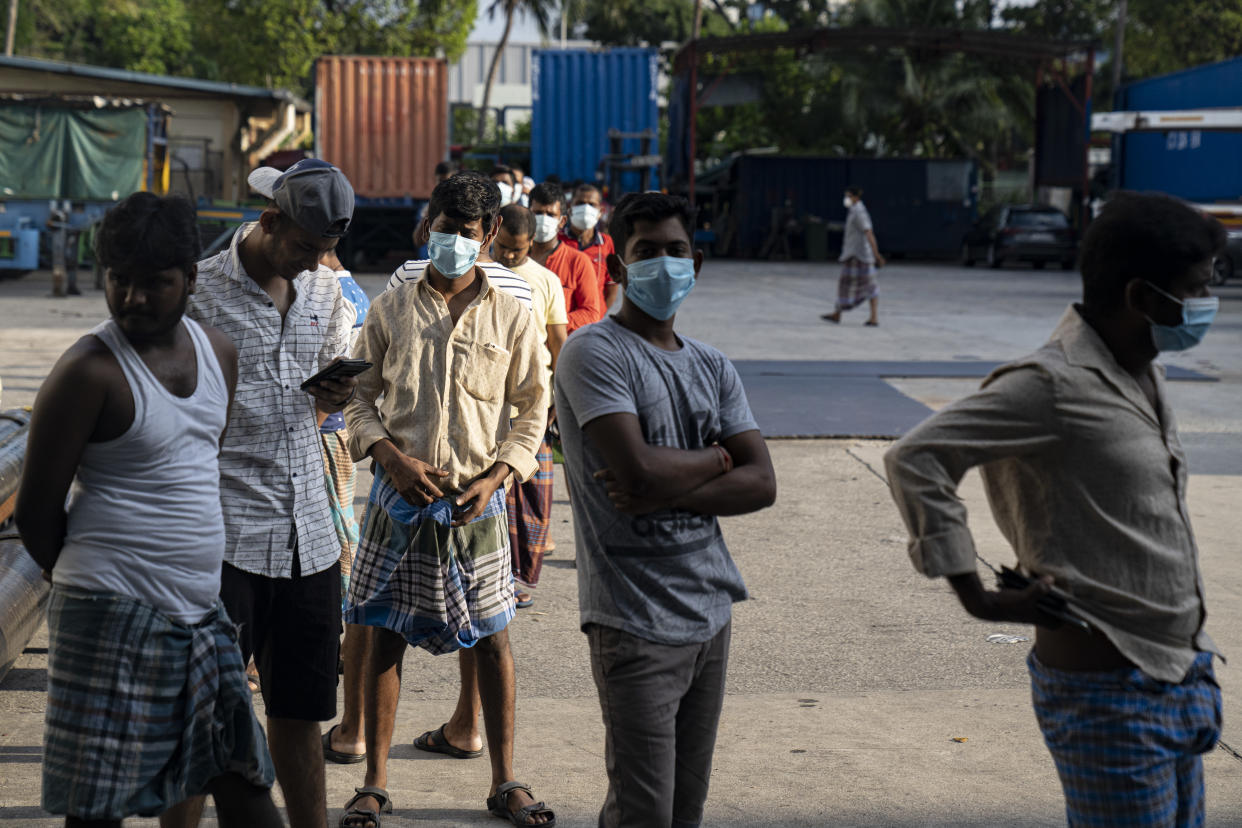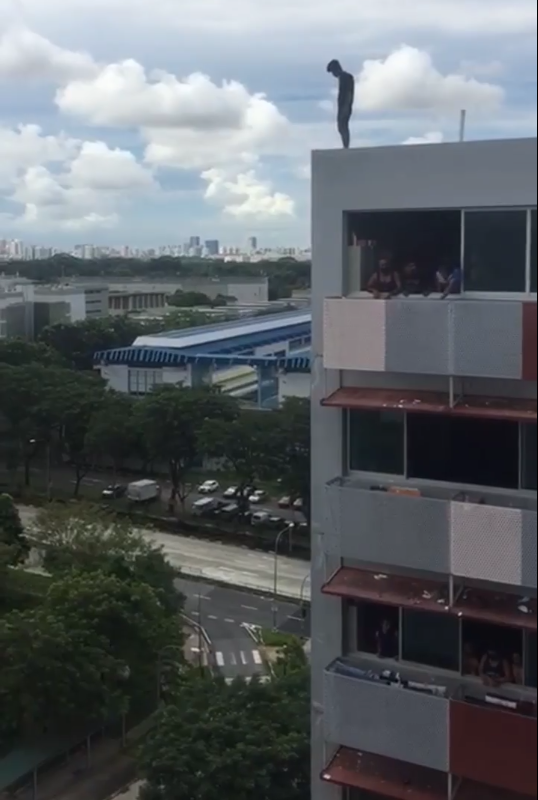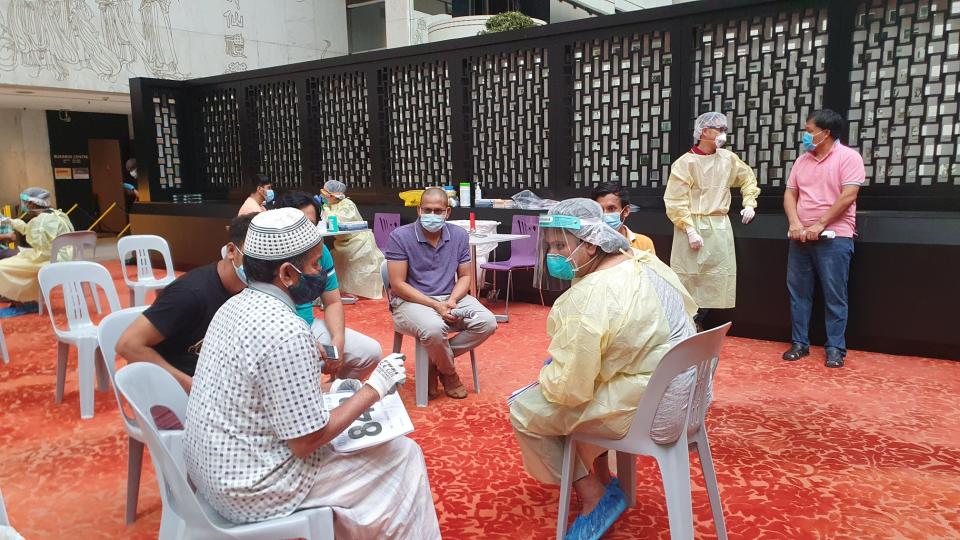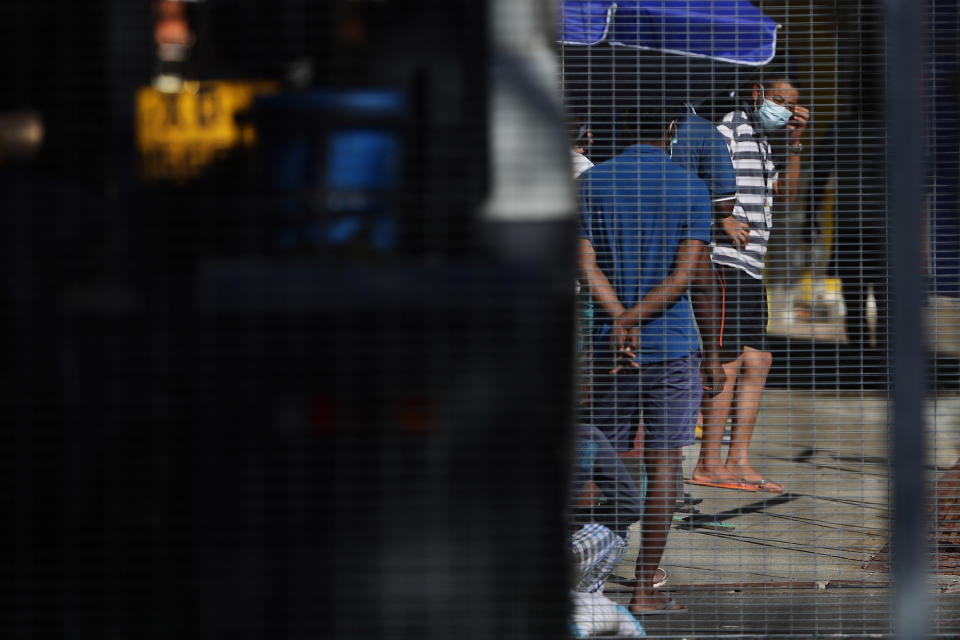At breaking point: Singapore's migrant workers struggle with isolation, anxiety amid COVID-19 curbs

SINGAPORE — More than three weeks after the sudden death of his older brother, Govindaraj Murugesan is still trying to find the answers.
“My friend called me about 830, 845am. He said, your brother (Govindaraj Veerasamy) is hanging in the kitchen area,” said the 32-year-old, who hails from Thanjavur in Tamil Nadu and has been working in Singapore for a decade.
Veerasamy, 37, was found motionless in the early hours of the morning on 24 July at Sungei Tengah Lodge, where he was pronounced dead at the scene by a paramedic. This is the largest purpose-built dormitory in Singapore, housing some 25,000 workers in 10 residential blocks at Old Choa Chu Kang Road.
Police have classified the case as unnatural death and do not suspect foul play. Investigations are ongoing.
Murugesan, who lives in an HDB flat, told Yahoo News Singapore that he called the dorm but was not allowed in due to ongoing lockdown measures. He eventually saw his older brother’s body at a hospital mortuary.
“I try and send him back home to India, but they say cannot because of Covid-19.” Veerasamy was later cremated and his ashes are currently resting in a columbarium in Mandai.
Murugesan last spoke to his brother, who was a site supervisor in the construction industry and married with two children, over the phone three days before his death. The brothers, who spoke regularly, discussed family matters and Veerasamy seemed fine.
“My friends say a few days before, his mind (was) very upset. I also don’t know why he go and hanging (sic). He is very strong man, how can he go and hanging? He never inform me.”
Veerasamy’s death came amid a recent spate of incidents of attempted suicide involving migrant workers residing in dormitories, who have been living under lockdown, partial or otherwise, since 21 April. On the day of his death, videos circulated on social media of separate incidents at Sungei Tengah Lodge and another dorm at 29 Senoko South Road, where workers had to be pulled away from the edge of elevated areas.
In one incident, a worker allegedly slit his throat on the morning of 2 August at a dormitory in Sungei Kadut. Police later apprehended the 36-year-old man under the Mental Health (Care and Treatment) Act. He is said to be in stable condition. In response to the incident, the Ministry of Manpower (MOM) said, "MOM advises all workers not to put themselves in harm's way if they encounter problems. If they act rashly, it will make it more difficult for MOM to be able to assist them or to help solve their problems sooner."
And on 31 July, dramatic footage emerged of a worker standing on the 8th floor ledge of a block at The Leo, a dormitory in Kaki Bukit. The 27-year-old man was eventually pulled to safety and also apprehended under the mental health law.
Two other cases of unnatural death in the dorms were also reported in April and May.
On Thursday (6 August), MOM told CNA, ““The Ministry of Manpower is aware of the recent spate of suicides and attempted suicides involving migrant workers living at the dormitories.”
“While we have not observed a spike in the number of migrant worker suicides compared to previous years, we are monitoring the situation and are working closely with our partners and NGOs to enhance our mental health support programmes for the workers.”
The ministry added that its Forward Assurance and Support Teams (FAST) - public officers stationed at the dormitories – will continue to “proactively look out for residents whom they assess may benefit from speaking to a mental health counsellor”.
“We have also worked with IMH to train and better equip frontline staff with the knowledge and skills to help workers who may require support.”
Movements heavily controlled

More than 300,000 migrant workers are currently living under restricted conditions at purpose-built dormitories and factory-converted dormitories, in a bid to control the spread of the coronavirus.
From 21 April, authorities began a lockdown of the dorms in response to the massive outbreak of the virus among migrant workers. As of 6 August, migrant workers living in dorms account for some 94 per cent of Singapore’s 54,555 cases.
Some 273,000 workers staying in dorms have either recovered or been tested and found to be free of the virus, as of 5 August.
Education Minister Lawrence Wong, who co-chairs the multi-ministry taskforce on COVID-19, earlier said that all foreign worker dorms will be cleared by 7 August, save for 17 standalone blocks in eight purpose-built dormitories that serve as quarantine facilities. They presently house some 9,700 workers who are still serving out their isolation period.
In a press release on Tuesday, the MOM stressed again that it has made progress over the past weeks in “progressively allowing more foreign workers to resume work”.
However, the movements of those who are allowed to go to work are heavily controlled. For example, they are required to download three apps: TraceTogether, FWMOMCare and SGWorkPass, which enable authorities to account for their whereabouts, monitor their health and facilitate contact tracing. They are not allowed to socialise and must return to the dorms immediately after work.
Dorm operators must adhere to stringent measures such as ensuring regulated exit and entry points, and using dedicated transport to get the workers to and from work. Employers must also apply to the relevant ministries such as the Building and Construction Authority for permission to deploy their workers.
Within the dorms, intermingling between different blocks and even different floors is heavily restricted, with many only allowed to leave their rooms to collect food or go to the toilet, depending on their health status.
‘Anxiety, uncertainty, disquiet’
Migrant workers and non-governmental organisations told Yahoo News Singapore that there has been an uptick in stress and anxiety levels among those residing in the dorms, as the prolonged effects of isolation and financial, family and employment worries take their toll. There have been multiple reports of physical and verbal altercations, as well as self-harm and suicide ideation.
The migrant worker NGO Healthserve has reported a tripling in the number of cases of suicide ideation in the past two weeks.
A construction supervisor from India, who has been working in Singapore for more than 15 years, said, “They are stuck in the dorm for more than three months. A lot of people (have) mental health problems,” he said. “They fight in the dormitory. Pandemic really very difficult time, because they cannot go and meet their friends. They want to go drinking and smoking, (but they cannot, so) they become very stressed.”
In one incident, a worker at a dorm in Bidadari ended up assaulting a security officer when he was not allowed to leave the premises. Police were called in and the worker was sent for counselling. Another incident saw a worker standing outside the railing of his room at a dorm in Senoko South Road until he was persuaded to come down, said the supervisor, who declined to be named.
He added that only about a quarter of his company’s 400 workers have been allowed to resume work. “The ones who are working, they are able to move about, then their mindset different. But before this, they can only sweep the room. They cannot even go to other levels. Some cannot send money to their families.”
Lawyer Dipa Swaminathan is founder of migrant worker advocacy group Itsrainingraincoats, which continues to reach out to the workers. While the NGO does not offer counselling services, it has close to 700 volunteers doing English language sessions who have become buddies to many of the workers. “Through this, we have heard about workers feeling stressed, anxious, cooped up. There is a certain level of uncertainty and disquiet among many of them. A lot of these guys live on the fringe of desperation, and they might react in certain ways.”
On one recent occasion, volunteers stayed up till midnight because a worker had told his teacher he would do “something” but didn’t specify what it was. Police were called because the worker stopped responding, and he was taken to hospital. He has since returned to his dorm and is doing much better.
Swaminathan said that people would understand what the migrant workers are going through if they were in their shoes, adding that these workers are feeling the strain of not knowing when the restrictions would end.
“If you are in a comfortable room with a TV and easy access to food and drinks, it’s okay. But even with those luxuries, try locking yourself in for 20 days without the ability to go out and take a walk freely: you might want to open a window and scream.”
As such, it is important to consider how to alleviate the anxiety of the workers. “We might be labouring under a false sense of security to think that there won’t be any more cases. It is only realistic to expect that anxiety levels will continue to persist the longer they stay indoors.”
What is being done to help?

In response to queries, the MOM referred Yahoo News Singapore to official advisories, as well as Manpower Minister Josephine Teo’s written answer on 5 June to a parliamentary question on mental healthcare provided to workers living in the dorms.
Teo noted that the MOM partners with NGOs such as the Migrant Workers’ Centre (MWC) and Healthserve to meet the mental well-being of migrant workers. Additionally, FAST teams and MWC’s network of 5,000 ambassadors proactively look out for residents who may need help and refer them to a mental health counsellor.
Workers can also call the MWC’s 24-hour helpline for assistance on any issues or a listening ear. And in April, Healthserve launched a dedicated mental wellness hotline where workers can access important medical information and submit requests for tele-counselling sessions in their native languages.
The Ministry of Health has yet to respond to Yahoo News Singapore’s query on its assessment of the impact of the multiple restrictions on workers’ mental health.
According to Healthserve’s head of communications and engagement, Suwen Low, from April to July, the NGO engaged with over 700 participants virtually through counselling clinics and group sessions - all related to the COVID-19 crisis. It has also been training between 80 and 100 volunteers to help out with engagement activities and focus group discussions.
“But recently we have had more referrals coming to us for high risk cases such as self harm and suicide ideations. Our teams are active in various ways in more than 15 dorms/facilities," said Low, who added that her mental health team is activated “every few days”, while a virtual counselling clinic is held every week.
Being stuck in lockdown for about four months is causing a lot of frustration for the workers, Low said. “When overnight, you take people away from their jobs and you ask them to stay in an area for their own good, they can understand it, but there’s only so much they can take.”
She noted that many had been isolated in hotels or isolation facilities for about one to two months. “Some have not seen a human being on a regular basis for two months. That sort of isolation is not good for anyone. Even if you put someone in a nice hotel room, they are still in isolation.”
And while conditions have improved slightly, with more freedom of movement, the key issues remain: anxiety from feeling trapped and wanting to go back to their home countries, but not being able to do so, as well as a fear of losing their jobs. Many have asked for grief counselling as they lost family members back home but are stuck in Singapore.
The anxiety sometimes manifests itself in aggression, said Low. Other lose their appetite or are unable to sleep because they are unable to process what is happening. “They start to be more vocal and angry, or they act like they are going to harm themselves. They don’t really want to but they don’t know how else to express it. I have seen someone shave their head, just as a way of taking control of their situation.”

Low conceded that the various stakeholders involved – dorm operators, employers, the healthcare system and authorities – are having a hard time adapting to an ever-evolving situation. Fatigue is setting in and affecting many people, particularly the workers.
“The only way this can resolve is if you give them what they want, which is very difficult now: the freedom to go out of the dorms and go back to work and move around freely.”
If you know of migrant workers in distress or in need of assistance, they can call the following helplines:
Healthserve: 31384443 (WhatsApp or call)
Migrant Workers’ Centre: 6536-2692
Samaritans of Singapore: 1800-221-4444
Institute of Mental Health’s Mobile Crisis Service: 6389-2222
Related stories
COVID-19: 581 of 908 new cases in S'pore linked to Acacia Lodge cluster
MOM: About 89% of migrant workers recovered or tested free from COVID-19
COMMENT: Singapore’s treatment of foreign workers is a stain we can do without



